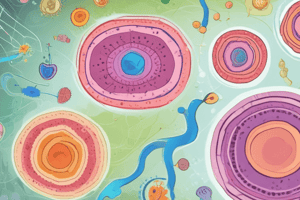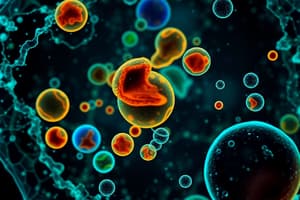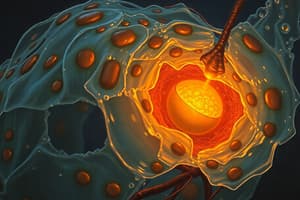Podcast
Questions and Answers
What is the primary function of mitochondria within a cell?
What is the primary function of mitochondria within a cell?
- Storing nutrients
- Synthesizing proteins
- Facilitating transport
- Producing energy (correct)
How do eukaryotic cells reproduce?
How do eukaryotic cells reproduce?
- Through binary fission
- Using conjugation
- By lysing
- Via meiosis (correct)
Which cellular structure is primarily responsible for synthesizing proteins?
Which cellular structure is primarily responsible for synthesizing proteins?
- Mitochondria
- Ribosomes (correct)
- Golgi apparatus
- Endoplasmic reticulum
What drives processes like cell migration and contraction?
What drives processes like cell migration and contraction?
In which process do proteins get targeted for specific locations within or outside the cell?
In which process do proteins get targeted for specific locations within or outside the cell?
How do prokaryotic cells typically split?
How do prokaryotic cells typically split?
What is one of the essential tools gained by studying cell biology?
What is one of the essential tools gained by studying cell biology?
Which field benefits from evaluating risks associated with chemicals on human body systems?
Which field benefits from evaluating risks associated with chemicals on human body systems?
What is one application of genetic modification mentioned in the text?
What is one application of genetic modification mentioned in the text?
How does cell biology contribute to addressing challenges in fields like food security and environmental sustainability?
How does cell biology contribute to addressing challenges in fields like food security and environmental sustainability?
What insights do we gain by studying the underlying mechanisms of life according to the text?
What insights do we gain by studying the underlying mechanisms of life according to the text?
What exciting avenues of exploration and application does cell biology offer according to the text?
What exciting avenues of exploration and application does cell biology offer according to the text?
Flashcards are hidden until you start studying
Study Notes
Exploring the World of Cell Biology: A Guide for Biology Students
Cell biology lies at the heart of life sciences, exploring the structures, functions, and interactions within cells—the fundamental units of living matter. Whether through hands-on research or classroom lessons, delving into cellular mechanisms opens doors to a deeper understanding of biology.
Key Concepts
At the core of cell biology lie several pivotal concepts:
-
Organization: Cells consist of specialized compartments enclosed by membranes called organelles. These components play vital roles such as producing energy (mitochondria), synthesizing proteins (ribosomes), storing nutrients (endoplasmic reticulum), and facilitating transport (Golgi apparatus).
-
Division: Eukaryotic cells reproduce via mitosis or meiosis, whereas prokaryotes split through binary fission.
-
Communication: Signals pass between cells through gap junctions and secreted molecules, regulating tissue organization.
-
Protein trafficking: Proteins are processed, modified, and targeted through endocytosis and exocytosis.
-
Movement: Actin filaments drive processes like migration, contraction, and vesicle movement.
-
Metabolism: Energy production occurs primarily through glycolysis, citric acid cycle, and oxidative phosphorylation.
Real-World Applications
Biology research assistants often employ cell biology techniques. For instance, they perform cell culturing, manipulate gene expression, image microscopic structures, and analyze molecular pathways. Gaining familiarity with cell biology provides essential tools that allow us to understand diseases and develop treatments:
- Drug discovery: Detecting targets and designing drugs based on intracellular signaling events and protein structure.
- Toxicity assessment: Evaluating potential risks associated with chemicals, allergens, pollutants, etc., on human body systems.
- Genetic modification: Engineering cells to express desired traits, create genetically engineered organisms, and combat disease through gene therapy.
In conclusion, cell biology forms a cornerstone of modern biology, offering exciting avenues of exploration and application. By studying the underlying mechanisms of life, we gain valuable insights into the inner workings of living beings. Additionally, advances in cell biology enable us to address pressing challenges in fields ranging from food security and environmental sustainability to human health and longevity.
Studying That Suits You
Use AI to generate personalized quizzes and flashcards to suit your learning preferences.





